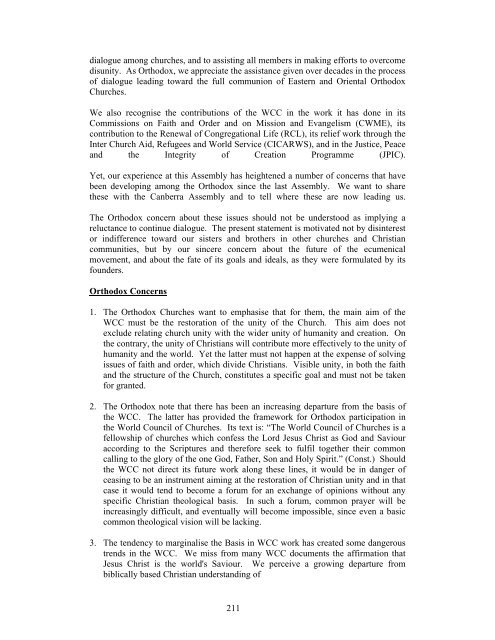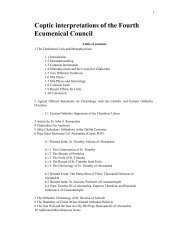Coptic Church & Ecumenical Movement - Saint Mina Coptic ...
Coptic Church & Ecumenical Movement - Saint Mina Coptic ...
Coptic Church & Ecumenical Movement - Saint Mina Coptic ...
Create successful ePaper yourself
Turn your PDF publications into a flip-book with our unique Google optimized e-Paper software.
dialogue among churches, and to assisting all members in making efforts to overcome<br />
disunity. As Orthodox, we appreciate the assistance given over decades in the process<br />
of dialogue leading toward the full communion of Eastern and Oriental Orthodox<br />
<strong>Church</strong>es.<br />
We also recognise the contributions of the WCC in the work it has done in its<br />
Commissions on Faith and Order and on Mission and Evangelism (CWME), its<br />
contribution to the Renewal of Congregational Life (RCL), its relief work through the<br />
Inter <strong>Church</strong> Aid, Refugees and World Service (CICARWS), and in the Justice, Peace<br />
and the Integrity of Creation Programme (JPIC).<br />
Yet, our experience at this Assembly has heightened a number of concerns that have<br />
been developing among the Orthodox since the last Assembly. We want to share<br />
these with the Canberra Assembly and to tell where these are now leading us.<br />
The Orthodox concern about these issues should not be understood as implying a<br />
reluctance to continue dialogue. The present statement is motivated not by disinterest<br />
or indifference toward our sisters and brothers in other churches and Christian<br />
communities, but by our sincere concern about the future of the ecumenical<br />
movement, and about the fate of its goals and ideals, as they were formulated by its<br />
founders.<br />
Orthodox Concerns<br />
1. The Orthodox <strong>Church</strong>es want to emphasise that for them, the main aim of the<br />
WCC must be the restoration of the unity of the <strong>Church</strong>. This aim does not<br />
exclude relating church unity with the wider unity of humanity and creation. On<br />
the contrary, the unity of Christians will contribute more effectively to the unity of<br />
humanity and the world. Yet the latter must not happen at the expense of solving<br />
issues of faith and order, which divide Christians. Visible unity, in both the faith<br />
and the structure of the <strong>Church</strong>, constitutes a specific goal and must not be taken<br />
for granted.<br />
2. The Orthodox note that there has been an increasing departure from the basis of<br />
the WCC. The latter has provided the framework for Orthodox participation in<br />
the World Council of <strong>Church</strong>es. Its text is: “The World Council of <strong>Church</strong>es is a<br />
fellowship of churches which confess the Lord Jesus Christ as God and Saviour<br />
according to the Scriptures and therefore seek to fulfil together their common<br />
calling to the glory of the one God, Father, Son and Holy Spirit.” (Const.) Should<br />
the WCC not direct its future work along these lines, it would be in danger of<br />
ceasing to be an instrument aiming at the restoration of Christian unity and in that<br />
case it would tend to become a forum for an exchange of opinions without any<br />
specific Christian theological basis. In such a forum, common prayer will be<br />
increasingly difficult, and eventually will become impossible, since even a basic<br />
common theological vision will be lacking.<br />
3. The tendency to marginalise the Basis in WCC work has created some dangerous<br />
trends in the WCC. We miss from many WCC documents the affirmation that<br />
Jesus Christ is the world's Saviour. We perceive a growing departure from<br />
biblically based Christian understanding of<br />
211








